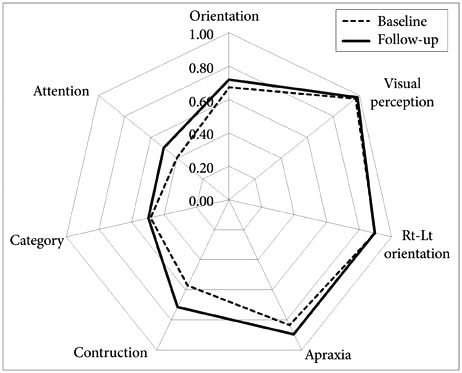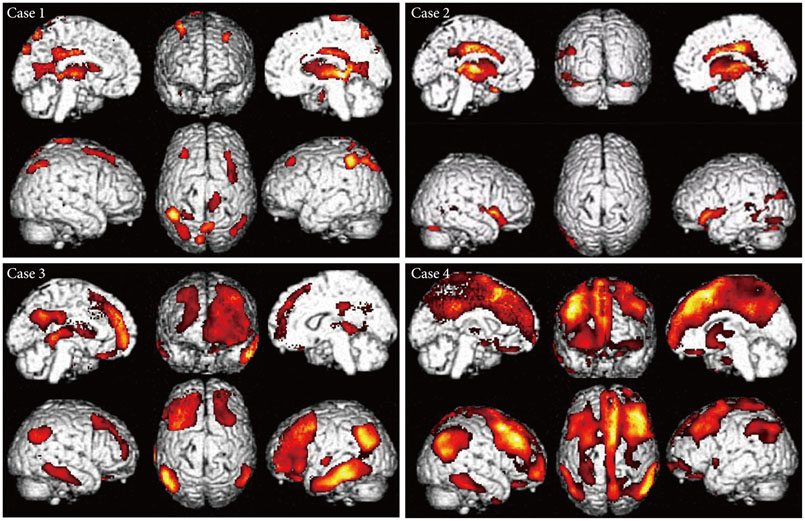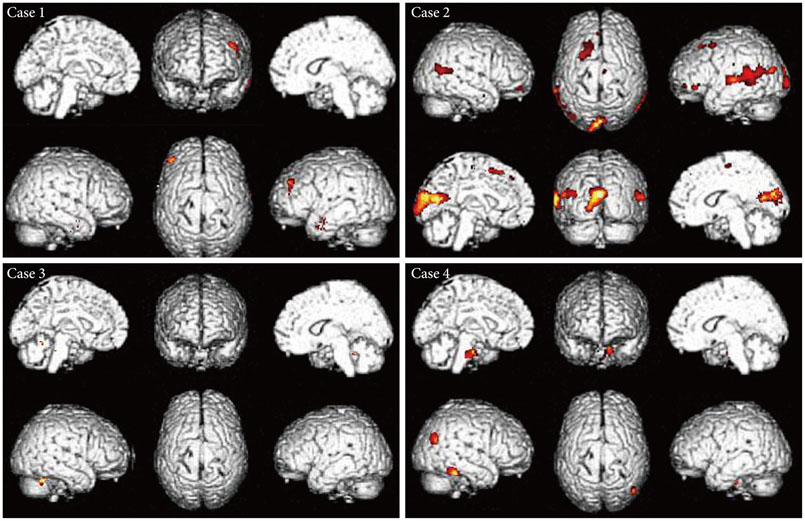Dement Neurocogn Disord.
2015 Jun;14(2):76-82. 10.12779/dnd.2015.14.2.76.
Cognitive Therapy Combined with Drug Treatment in Patients with Alzheimer's Disease: A Neuropsychological and Positron Emission Tomography Investigation, a Pilot Study
- Affiliations
-
- 1Department of Neurology, Bobath Memorial Hospital, Seongnam, Korea.
- 2Department of Neurology, Seoul National University College of Medicine & Clinical Neuroscience Center, Seoul National University Bundang Hospital, Seoul, Korea. neuroksy@snu.ac.kr
- 3Department of Nuclear Medicine, Seoul National University Bundang Hospital, Seongnam, Korea.
- 4Department of Neurology, College of Medicine, Korea University, Seoul, Korea.
- 5Department of Urology, College of Medicine, Hallym University, Seoul, Korea.
- KMID: 2443005
- DOI: http://doi.org/10.12779/dnd.2015.14.2.76
Abstract
- BACKGROUND
Cognitive therapy may have therapeutic benefit in patients with early Alzheimer's disease (AD).
CASE REPORT
This was a 12-week, single-blind pilot study of 4 patients with AD. The cognitive therapy included exercises for orientation to time and place; memory training, including face-name association, object recall training, and spaced retrieval; visuo-motor organization using software; similarity and ruled based categorization; and behavior modification and sequencing (e.g., making change, paying bills). The regional cerebral metabolic abnormalities and the effects of treatment on cortical metabolic responses were evaluated using 18F-2-fluoro-2-deoxy-D-glucose positron emission tomography (PET). After 12 weeks, the participants showed slight improvement in some neuropsychological measures, and three of them showed increased regional cortical metabolism on brain PET studies.
CONCLUSIONS
Cognitive therapy may stabilize or improve cognitive and functional performance of patients with early AD and increase regional cortical metabolism of the patients' brain.
Keyword
MeSH Terms
Figure
Reference
-
1. Kaplan HI, Sadock BJ. Comprehensive textbook of psychiatry. 6th ed. Baltimore, MD: Williams & Wilkins;1995.
Article2. Davis RN, Massman PJ, Doody RS. Cognitive intervention in Alzheimer disease: a randomized placebo-controlled study. Alzheimer Dis Assoc Disord. 2001; 15:1–9.
Article3. Aldridge D. Music therapy in dementia care: more new voices. London: Jessica Kingsley;2000.
Article4. Requena C, López Ibor MI, Maestú F, Campo P, López Ibor JJ, Ortiz T. Effects of cholinergic drugs and cognitive training on dementia. Dement Geriatr Cogn Disord. 2004; 18:50–54.
Article5. Israel L, Melac M, Milinkevitch D, Dubos G. Drug therapy and memory training programs: a double-blind randomized trial of general practice patients with age-associated memory impairment. Int Psychogeriatr. 1994; 6:155–170.
Article6. Loewenstein DA, Acevedo A, Czaja SJ, Duara R. Cognitive rehabilitation of mildly impaired Alzheimer disease patients on cholinesterase inhibitors. Am J Geriatr Psychiatry. 2004; 12:395–402.
Article7. Baker R, Bell S, Baker E, Gibson S, Holloway J, Pearce R, et al. A randomized controlled trial of the effects of multi-sensory stimulation (MSS) for people with dementia. Br J Clin Psychol. 2001; 40(Pt 1):81–96.
Article8. Spector A, Davies S, Woods B, Orrell M. Reality orientation for dementia: a systematic review of the evidence of effectiveness from randomized controlled trials. Gerontologist. 2000; 40:206–212.
Article9. Clare L, Woods RT, Moniz Cook ED, Orrell M, Spector A. Cognitive rehabilitation and cognitive training for early-stage Alzheimer's disease and vascular dementia. Cochrane Database Syst Rev. 2003; 4:CD003260.
Article10. Clare L, Woods RT. Cognitive training and cognitive rehabilitation for people with early-stage Alzheimer's disease: a review. Neuropsychol Rehabil. 2004; 5:385–401.
Article11. Olazarán J, Muñiz R, Reisberg B, Peña-Casanova J, del Ser T, Cruz-Jentoft AJ, et al. Benefits of cognitive-motor intervention in MCI and mild to moderate Alzheimer disease. Neurology. 2004; 63:2348–2353.12. Spector A, Orrell M, Davies S, Woods RT. Reminiscence therapy for dementia. Cochrane Database Syst Rev. 2000; 4:CD001120.13. Breuil V, De Rotrou J, Forette F, Tortrat D, Ganansia-Ganem A, Frambourt A, et al. Cognitive stimulation of patients with dementia: preliminary results. Int J Geriatr Psychiatry. 1994; 9:211–217.14. Teri L, Gibbons LE, McCurry SM, Logsdon RG, Buchner DM, Barlow WE, et al. Exercise plus behavioral management in patients with Alzheimer disease: a randomized controlled trial. JAMA. 2003; 290:2015–2022.15. Orrell M, Spector A, Thorgrimsen L, Woods B. A pilot study examining the effectiveness of maintenance Cognitive Stimulation Therapy (MCST) for people with dementia. Int J Geriatr Psychiatry. 2005; 20:446–451.
Article16. Ball K, Berch DB, Helmers KF, Jobe JB, Leveck MD, Marsiske M, et al. Effects of cognitive training interventions with older adults: a randomized controlled trial. JAMA. 2002; 288:2271–2281.
Article17. Farina E, Fioravanti R, Chiavari L, Imbornone E, Alberoni M, Pomati S, et al. Comparing two programs of cognitive training in Alzheimer's disease: a pilot study. Acta Neurol Scand. 2002; 105:365–371.18. Grandmaison E, Simard M. A critical review of memory stimulation programs in Alzheimer's disease. J Neuropsychiatry Clin Neurosci. 2003; 15:130–144.19. Poon P, Hui E, Dai D, Kwok T, Woo J. Cognitive intervention for community-dwelling older persons with memory problems: telemedicine versus face-to-face treatment. Int J Geriatr Psychiatry. 2005; 20:285–286.20. Bäckman L. Memory training and memory improvement in Alzheimer's disease: rules and exceptions. Acta Neurol Scand Suppl. 1992; 139:84–89.21. Bäckman L. Utilizing compensatory task conditions for episodic memory in Alzheimer's disease. Acta Neurol Scand Suppl. 1996; 165:109–113.22. Camp CJ, Foss JW, O'Hanlon AM, Stevens AB. Memory interventions for persons with dementia. Appl Cogn Psychol. 1996; 10:193–210.23. Gagnon DL. A review of reality orientation, validation therapy, and reminiscence therapy with the Alzheimer's client. Phys Occup Ther Geriatr. 1996; 14:61–77.24. Mohs RC, Doody RS, Morris JC, Ieni JR, Rogers SL, Perdomo CA, et al. A 1-year, placebo-controlled preservation of function survival study of donepezil in AD patients. Neurology. 2001; 57:481–488.25. Rogers SL, Doody RS, Mohs RC, Friedhoff LT. Donepezil Study Group. Donepezil improves cognition and global function in Alzheimer disease: a 15-week, double-blind, placebo-controlled study. Arch Intern Med. 1998; 158:1021–1031.26. Burt T. Donepezil and related cholinesterase inhibitors as mood and behavioral controlling agents. Curr Psychiatry Rep. 2000; 2:473–478.27. National Institute for Clinical Excellence. Guidance on the use of donepezil, rivastigmine and galantamine for the treatment of Alzheimer's disease (technology appraisal guidance). London: National Institute for Clinical Excellence;2001.
Article28. American Psychiatric Association. Diagnostic and Statistical. Manual of Mental Disorders. 4th ed. Washington, DC: American Psychiatric Association;1994. p. 143–146.
Article29. McKhann G, Drachman D, Folstein M, Katzman R, Price D, Stadlan EM. Clinical diagnosis of Alzheimer's disease: report of the NINCDS-ADRDA Work Group under the auspices of Department of Health and Human Services Task Force on Alzheimer's disease. Neurology. 1984; 34:939–944.30. Kang YW, Chin JH, Na DL. A validation study of the Digit Span Test. Korean J Clin Psychol. 2002; 21:911–922.31. Kang YW, Na DL. Seoul neuropsychological screening battery. Incheon: Human Brain Research & Consulting Co.;2003.32. Meyers JE, Meyers KR. Rey complex figure test and recognition trial: professional manual. Odessa, FL: Psychological Assessment Resources;1995.33. Kang YW, Chin JH, Na DL, Lee JH, Park JS. The standardization study of Controlled Oral Word Association Test for the aged. Korean J Clin Psychol. 2000; 19:385–392.34. Kim HH, Na DL. Korean-Boston naming test (K-BNT). Seoul: Hakjisa;1997.35. Katz N, Itzkovich M, Averbuch S, Elazar B. Loewenstein Occupational Therapy Cognitive Assessment (LOTCA) battery for brain-injured patients: reliability and validity. Am J Occup Ther. 1989; 43:184–192.
Article36. Folstein MF, Folstein SE, McHugh PR. "Mini-mental state". A practical method for grading the cognitive state of patients for the clinician. J Psychiatr Res. 1975; 12:189–198.
Article37. Kang Y, Na DL, Hahn S. A validity study on the Korean Mini-Mental State Examination (K-MMSE) in dementia patients. J Korean Neurol Assoc. 1997; 15:300–308.
Article38. Morris JC. The Clinical Dementia Rating (CDR): current version and scoring rules. Neurology. 1993; 43:2412–2414.
Article39. Reisberg B, Ferris SH, de Leon MJ, Crook T. The Global Deterioration Scale for assessment of primary degenerative dementia. Am J Psychiatry. 1982; 139:1136–1139.
Article40. Becker JT, Mintun MA, Aleva K, Wiseman MB, Nichols T, DeKosky ST. Compensatory reallocation of brain resources supporting verbal episodic memory in Alzheimer's disease. Neurology. 1996; 46:692–700.
Article41. Stern Y, Moeller JR, Anderson KE, Luber B, Zubin NR, DiMauro AA, et al. Different brain networks mediate task performance in normal aging and AD: defining compensation. Neurology. 2000; 55:1291–1297.
Article42. Le Carret N, Auriacombe S, Letenneur L, Bergua V, Dartigues JF, Fabrigoule C. Influence of education on the pattern of cognitive deterioration in AD patients: the cognitive reserve hypothesis. Brain Cogn. 2005; 57:120–126.
Article
- Full Text Links
- Actions
-
Cited
- CITED
-
- Close
- Share
- Similar articles
-
- The Prevalence of Rapid Eye Movement Sleep Behavior Disorder in Amyloid Positron Emission Tomography Positive Alzheimer's Disease
- Association between Cerebral Amyloid Deposition and Clinical Factors Including Cognitive Function in Geriatric Depression: Pilot Study Using Amyloid Positron Emission Tomography
- Beta-amyloid imaging in dementia
- Neuropsychological Assessment of Dementia and Cognitive Disorders
- The effects of low-dose radiation therapy in patients with mild-to-moderate Alzheimer's dementia: an interim analysis of a pilot study




